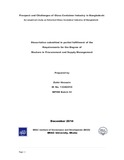| dc.contributor.advisor | Islam, Md. Zohurul | |
| dc.contributor.author | Hossain, Zakir | |
| dc.date.accessioned | 2015-08-24T09:11:10Z | |
| dc.date.available | 2015-08-24T09:11:10Z | |
| dc.date.copyright | 2014 | |
| dc.date.issued | 2014-12 | |
| dc.identifier.other | ID 13382010 | |
| dc.identifier.uri | http://hdl.handle.net/10361/4274 | |
| dc.description | This dissertation is submitted in partial fulfillment of the requirements for the degree of Masters in Procurement and Supply Management, 2014. | en_US |
| dc.description | Cataloged from PDF version of thesis report. | |
| dc.description | Includes bibliographical references (page 72). | |
| dc.description.abstract | Glass is a hard, brittle substance, typically transparent or translucent, made by fusing sand
with soda and lime and cooling rapidly. It is used to make windows, drinking containers, and
other articles. Container glass is a type of glass used for storing various liquid and solid
materials such as bottles, jars, drinkware, and bowls. Container glass has a lower
magnesium oxide and sodium oxide content than flat glass, and higher silica, calcium oxide,
and aluminium oxide content. Its higher content of water insoluble oxides imparts slightly
higher chemical durability against water, which is required for storage of beverages and
food. Most container glass is soda-lime glass, produced by blowing and pressing techniques,
while some laboratory glassware is made from borosilicate glass. Glass Container is a very
widely used component, its applications ranging from small vial to large Jar. In spite of its
versatility in application, Glass is a significantly underused in the Bangladesh market. There
are so many different types of glass containers and jars, and their properties differ with the
type of processing it undergoes. Glass is also an eco- friendly product and clocks a
signification contribution towards the protection of the environment.
Using glass container has so many advantages, but glass has been continuously overlooked
for cheaper alternatives non-renewable products like PET or Plastic products. My study
aims to explore the reasons for this situation and determine how and to what extent the
Bangladeshi market would be benefitted by a more visible glass industry. It seeks to inform
the reader about the advantages of glass containers (stressfully, environmental) in
comparison to other packaging materials like plastic, PET etc., so as to aid in future decision
making processes.
This survey reveals that Glass Container has significant positive impact on quality of the
product and sustainability of the environment. For the quality of the products, survey
observes that ‘to maintain the quality of the product inside the packaging, glass container
has contributed the highest assurance compare to any other kind of packaging’. Glass
container is 100% recyclable and thus environment friendly and it is sustainable. The survey
also revealed that about 60-65% people do not have proper knowledge on the impact of
product quality due to the packaging of the foods and beverage. | en_US |
| dc.description.statementofresponsibility | Zakir Hossain | |
| dc.format.extent | 72 pages | |
| dc.language.iso | en | en_US |
| dc.publisher | BRAC University | en_US |
| dc.rights | BRAC University dissertation are protected by copyright. They may be viewed from this source for any purpose, but reproduction or distribution in any format is prohibited without written permission. | |
| dc.subject | Procurement and supply management | en_US |
| dc.subject | Glass container industry | en_US |
| dc.subject | Production process | en_US |
| dc.title | Prospect and challenges of glass container industry in Bangladesh: an empirical study on selected glass container industry of Bangladesh | en_US |
| dc.type | Dissertation | en_US |
| dc.contributor.department | BRAC Institute of Governance and Development, BRAC University | |
| dc.description.degree | M. Procurement and Supply Management | |

